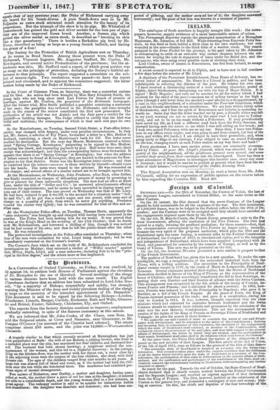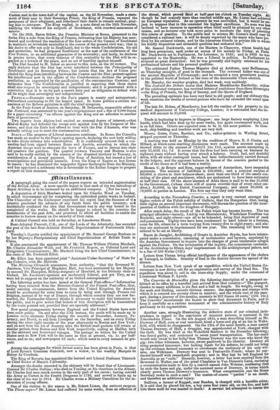Sortign anti Swrrzeer.awn.—On the 28th of November, the Canton of
Valais, the last of the Separate League, surrendered to Colonel Rilliet, on the same terms as the other Cantons.
On the 2d instant, the Diet decreed that the seven Cantons of the League . should be held accountable for all the expenses of the war. The first instalment, of 1,000,000 francs, was to be lodged in the Federal coffers before the 20th of De- cember; and the Cantons were to be occupied until they should have satisfied all the engagements imposed upon them by the Diet
On the 4th, M. Bras-le-Comte, the French Envoy, presented a note to the Fee deral Government, offering the mediation of the Five Powers. The Diet had agreed to a reply, refusing the proffered mediation; for these reasons—first, that the circumstances contemplated by the Five Powers no longer exist; secondly, because the very spirit of the proposed mediation, which puts the Diet and the Sonderbund upon the same footing, is contrary alike to the Federal Constitution of Switzerland, the Compact of 1815. to international rights; and to the integrity and independence of Switzerland, which have been acquired (conquisea) with its blood, and guaranteed for centuries by the consent of Europe, as well as by the treaty of Vienna. This note was to be presented on the 6th.
On the 5th, the Austrian Minister presented a note similar in purport to that of the French Government.
The position of Neufchatel has given rise to a new question. To make the case intelligible, we copy a recapitulation of the antecedent historical facts from the Times, with a trifling addition. The succession to the Principality of Neuf- chatel became vacant in 1707, by the death of Marie de Longueville, Datcheas of ' Nemours. Several claimants asserted their rights; but the States of Neufchatel themselves decided in favour of the King of Prussia as the representative of the house of Chalons; and they accordingly transferred the fief to that Sovereign, re- serving their own liberties and their treaties of alliance with the Swiss Canton'. This arrangement was recognized by the 9th article of the treaty of Utrecht, be- tween France and Prussia; and it subsisted for about a century. In 1805, how- ever, Prussia was induced to cede the Principality to Napoleon; who gave it to Berthier, as a fief of the French Empire. At the peace of Paris, the King of Prussia resumed possession of the state; and gave it a constitution, during his visit to London in 1814. It was, however, thought expedient that the close relations which had subsisted for centuries between Neufchatel and the Swiss Cantons should be rendered more definite and permanent by the admission of the state into the new Helvetic Confederation. This act was accompanied by no cession of the rights of the King of Prussia as Sovereign Prince of Neufchatel and Valangin: he gave his assent in these terms- . We authorize our said Council of State to conclude the union of our said Princi- pality with Switzerland, and its admission to the union of the Confederates ; desiring and meaning that, In consequence of this resolution, the execution of the engagements which the state of Neufchatel shall contract, as member of the Confederation, shall exclusively concern the government of the said place, and that with respect to the general affairs of Switzerland, the forms in which they are treated, and the participation hs their result, Neufchatel shall place itself in the relation, which exist between the Cantons."
At the same time, the Swiss Diet defined the nature of the obligations it im- posed on the new member of their League. The first article of the Act of Union, of the 7th of April 1815, runs as follows in the protocol of the Diet of that dateel-
" The sovereign state of Neufchatel Is received as a Canton into the Swiss Con- federation. This reception takes place under the express condition that the fulfilment of all the duties which devolve upon the state of Neufchatel as a member of the Con- federation, the participation of that state In deliberations on the general affairs of Scrlt- zeriand, and the ratification and performance of the resolutions of the Diet, shad ex- clusively concern the Uovernment residing is Neufchatel, withoutrequiting any further sanction or assent." So much for the past. Towards the end of October, the State Council of Neuf- chatel declared that it should remain neutral between the Federal Government and the Separate League; and received an express approval of that declaration from the King of Prussia. The Diet, however, insisted on the submission of the Canton to the general levy, and demanded a contingent of men and money; hint- ing at coercion. On this, the chiefs and deputies of the four townships of the.. Canton met in the town-hall of the capital, on the 2d November, made a state- ment of their case to their Sovereign Prince, the King of Prussia, repeated the assuranceof their allegiance, and redeclared their desire to remain neutral; pray- ing. him to interpose. The King replied, in a note dated on the 10th November, ratifying the wishes of his subjects of Neufchatel, with renewed assurances of esteem.
On the 26th, Baron Sidow, the Prussian Minister at Berne, presented to the Swiss Diet a note from the King of Prussia, intimating that his Majesty has sanc- tioned and confirmed the resolution of the four orders of the Canton of Neufchatel to maintain an inviolable neutrality in the course of the present civil war; that in his desire to offer not only to Neufchatel, but to the whole Confederation, his aid and protection, he had proposed Neufchatel as the seat of the conference of the Five Powers, as an additional guarantee of its neutrality; and lastly, he declares in precise terms that every violation of this neutrality b7 the Diet will be re- gar ed as a breach of the peace, and an act of hostility against himself. The Diet handed to M. Sidow an answer to this note, on the 2d instant. The
reply declares that the Diet has never interfered between the Principality of Neufchatel and its Sovereign Prince; but insists that the Act of Union pre- eluded the King from interfering between the Canton and the Diet; protests against his interference now in the affairs of the Confederation; declines the proposed mediation, as superseded by the pacification of the contumacious Cantons; and intimates that "the Confederation is. justified in expecting that those states shall also respect its sovereignty and independence; and it is penetrated with a conviction that it is on its part a sacred duty and an obligation to defend with all its might that sovereignty and independence."
Faasicz.—Domestic news in the Paris papers is scanty and unimportant; Switzerland continuing to fill the largest space. In home politics a certain un- easiness at the Reform agitation is still the chief symptom. In the Paris Court of Assizes, on Saturday, M. Delaroche, responsible editor of the National, was sentenced to one year's imprisonment and a fine of 8,000 francs for a paper containing "an offence against the King and an adhesion to another form of government."
Two reports from Algiers had excited an unusual degree of interest,—that Abd-el-Kader had defeated the troops sent against him by the Emperor of Mo- rocco; and that the Emir had offered to treat with the Duo d'Awnale, who was actually setting out to meet the contumacious chief.
ITALY.—The progress of Liberal measures continues. In Rome, the Consults
has made an answer to the Pope's opening speech, declaring the new body willing to take divers reforms into consideration. It is confidently averred that a con- vention had been signed between Rome and Austria, according to which the Austrian troops were to evacuate the town of Ferrara, and to retreat into their old quarters the garrison. The quarrel between Tuscany and Modena is also said to be really settled, by the cession of the disputed territory to Tuscany, in consideration of a money payment. The King of Sardinia has issued a law of municipalities and provincial councils. Even the King of Naples at last listens to reason : he has dismissed the unpopular Signor Santangelo from the Ministry, i and has appointed a nobleman who is favourable to the Italian League to prepare a report on that measure.



























 Previous page
Previous page